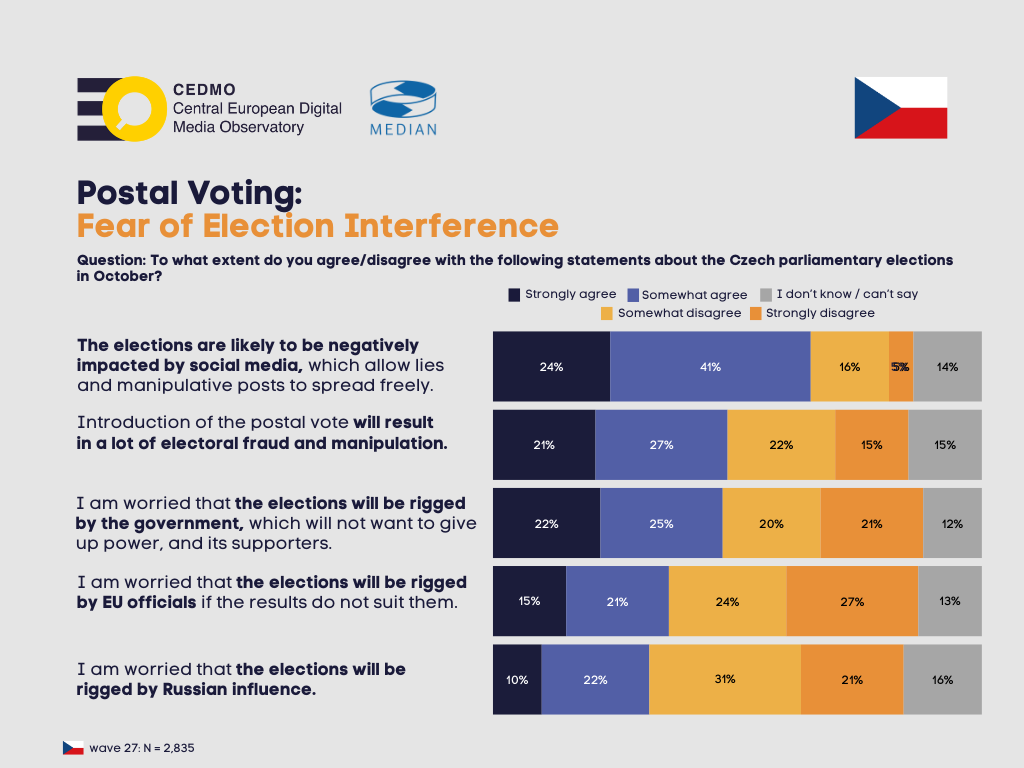
On October 3 and 4, elections to the Chamber of Deputies of the Parliament of the Czech Republic will take place. For the first time in history, Czechs living abroad will be able to vote by mail. In connection with this, a number of false reports have appeared in the digital information space in recent months, with the aim of undermining confidence in the integrity of the elections. We conducted a representative sociological survey to find out what specific information was involved, what the attitudes and confidence of the Czech population are towards this new tool, and to what extent they fear manipulation of the election results.
A representative sociological survey was conducted by CEDMO in cooperation with the Median agency at the turn of July and August. The survey was conducted at a time when the number of voters who had registered and requested the documents necessary for postal voting was not yet known. This information was published by the Ministry of Foreign Affairs at the beginning of September – there were 10,905 voters. The number of votes from abroad in this range (specifically between 10,000 and 50,000 votes) was correctly estimated by 21% of respondents, 11% guessed less, 35% guessed more, and one-third of respondents (33%) were unable to answer.
Almost half of the espondents (48%) said they were concerned about fraud and manipulation in connection with postal voting. According to respondents who fear fraud and manipulation, potential fraud and manipulation consist of the exchange or falsification of votes (73%), the loss or withholding of envelopes (40%), the deliberate late delivery of votes (35%), or the non-counting of votes due to formal errors (35%). Only 12% of respondents said they were definitely not concerned about the manipulation of postal voting. In terms of its importance for democracy, the option of postal voting is important for 38% of people.
“As part of the survey, we tested two selected false narratives related to postal voting. The first was a false claim that people abroad would only need to make a sworn statement that they had been Czech citizens in the past to obtain Czech citizenship, which would add 5-10 million new voters who would support the parties of the current governing coalition. According to the second claim tested, the BIS, in cooperation with the Constitutional Court, should invalidate the October parliamentary elections due to alleged interference by foreign powers, primarily Russia,” explains CEDMO data analyst Lukáš Kutil, adding: “At the time of testing, 27% of respondents considered the first narrative credible and 19% considered the second credible. Given the current low level of public awareness of the rules of postal voting, with only 4% of respondents declaring detailed knowledge and another 28% at least partial knowledge, and a total of 68% of respondents having only superficial knowledge or none at all, it appears that part of society is particularly vulnerable to similar claims circulating in the digital space.”

Efforts to undermine confidence in the integrity of elections in other European countries
Efforts to undermine confidence in the integrity of elections by spreading false information in the digital space have been reported by EDMO hubs in other countries where elections have taken place in recent months, such as Germany, Poland, and Romania—the first EU member state where the constitutional court annulled the elections after the electoral integrity was significantly undermined.
In the run-up to the recent presidential elections in Poland, CEDMO recorded the spread of a number of disinformation narratives aimed at undermining public confidence in democratic processes and institutions. According to a report by Demagog.pl, which verifies the accuracy of claims in the Polish information space as part of CEDMO, most of these narratives concerned the electoral process itself and its results. For example, claims that ballots would be manipulated using erasable pens, invalidated by adding a second cross, or that one voter could vote multiple times. Other narratives directly questioned the election results, suggesting that one of the candidates received fewer votes than pre-election polls had indicated.
CEDMO will continue to monitor developments in public opinion and the information environment in connection with the parliamentary elections. Further findings will be available on website.
The thematic report is available in the following versions:
CEDMO Trends offers exceptional insight into the evolution of the population’s behaviour in the consumption of different types of media content, focusing on particular types of information disorders such as misinformation and disinformation. These not only undermine public trust in the institutions necessary for the functioning of a pluralistic democracy, but can also amplify individual infodemics. It is being carried out in the Czech Republic by the research agency Median for the Central European Digital Media Observatory (CEDMO) on a representative sample of 2,700-3,000 respondents aged 16 and older. In Slovakia, it is carried out by the research agency IPSOS on a representative sample of more than 1 600 – 2 300 respondents over 16 years of age.
The CEDMO TRENDS research in the Czech Republic is funded by the National Recovery Plan under the project 1.4 CEDMO 1 – Z220312000000 Support to increase the impact, innovation, and sustainability of CEDMO in the Czech Republic. The data collection in Slovakia is funded by the National Recovery Plan – project called MPO 60273/24/21300/21000 CEDMO 2.0 NPO.

The CEDMO Special Brief “Attitudes towards postal voting: Low awareness but strong opinions” was produced as part of project 101158609, co-funded by the European Union under call DIGITAL-2023-DEPLOY-04. The content of the publication and press release reflects only the views of the independent CEDMO consortium, and therefore, the European Commission bears no responsibility for any use of the information contained therein.

